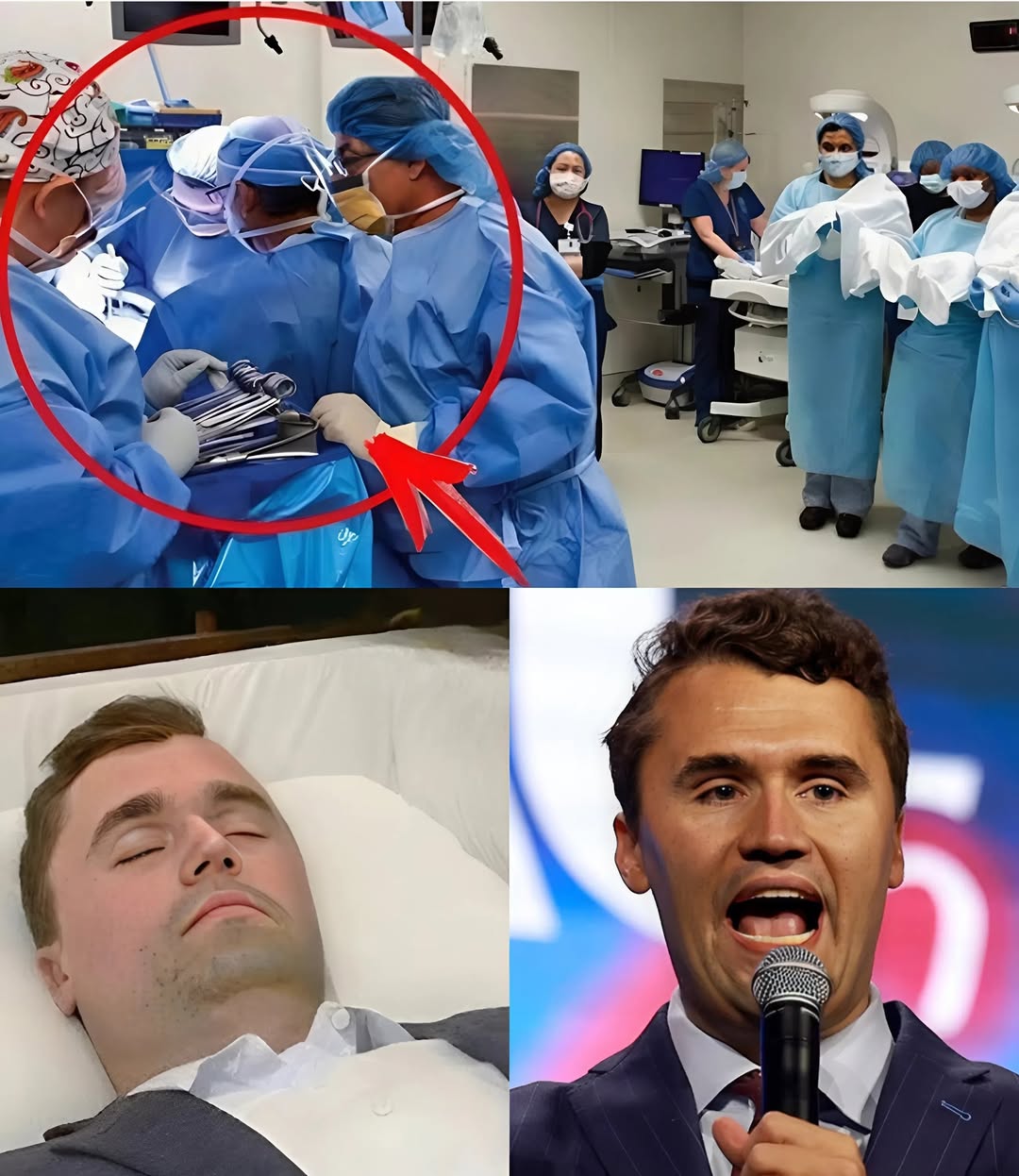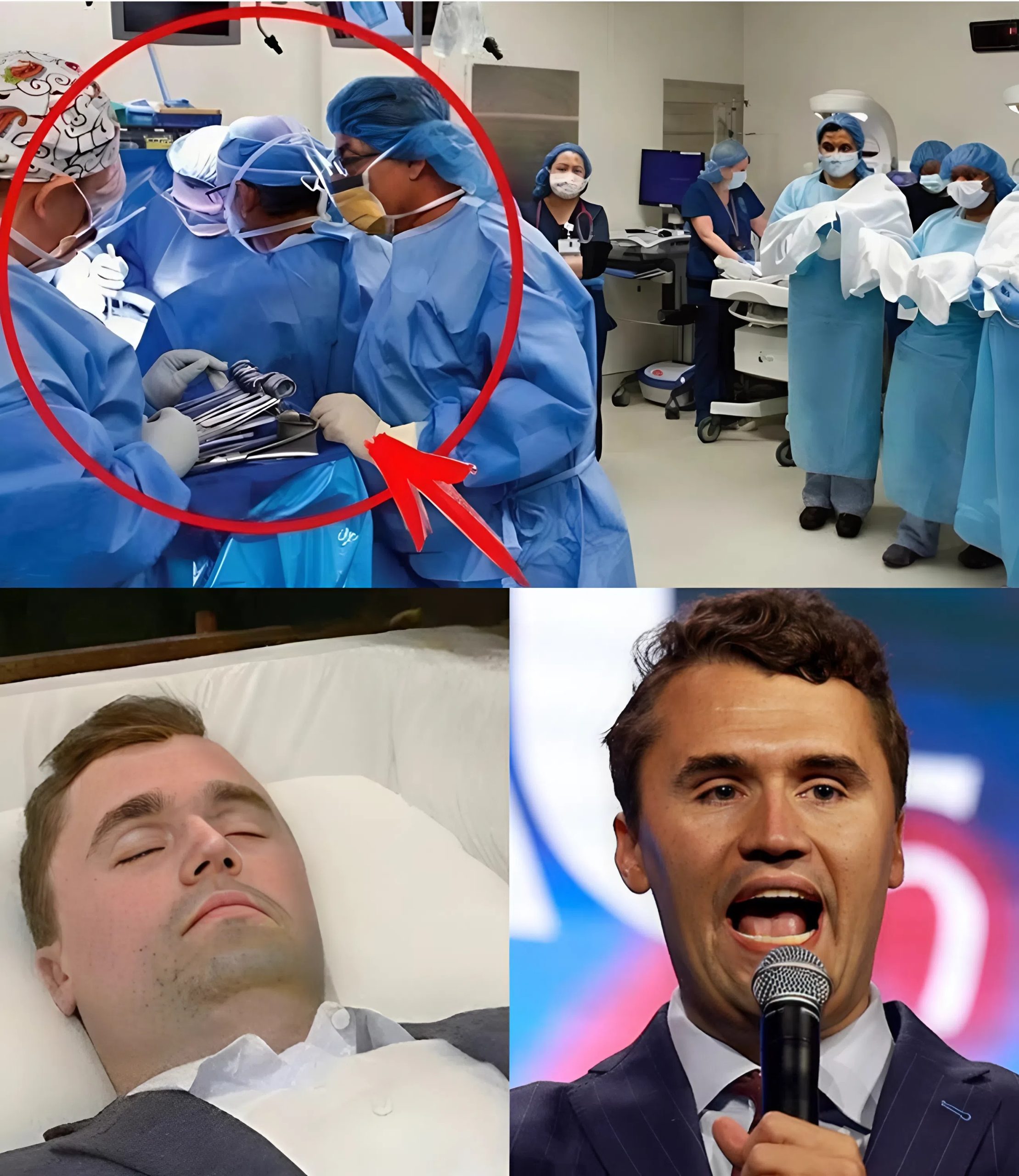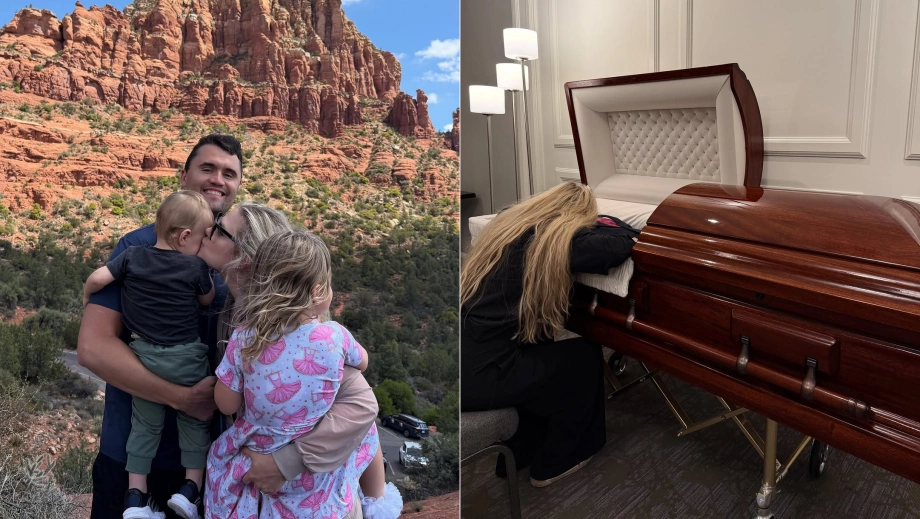
For weeks, speculation has swirled around the sudden passing of Charlie Kirk, the outspoken political commentator and activist whose voice once dominated conservative circles in America. Official explanations offered little more than vague references to “medical complications.” Rumors filled the silence. But this week, the narrative shifted dramatically when a whistleblower — a doctor who treated Kirk in his final moments — leaked raw emergency room footage.
This footage, never meant to be seen by the public, has transformed Kirk’s death from a private tragedy into a national controversy. It has exposed unsettling inconsistencies, raised disturbing questions about what authorities knew, and ignited a debate about truth, power, and transparency.
The Night That Changed Everything
Charlie Kirk’s collapse reportedly occurred in the late evening hours, after a day packed with meetings and phone calls. He was rushed to the nearest trauma center, where medical staff fought to stabilize him. Official accounts described his decline as sudden but offered no elaboration.

The leaked footage tells a different story. It shows Kirk conscious, struggling for breath but intensely aware of his surroundings. Monitors beep urgently, nurses move frantically, but Kirk’s attention is fixed not on his failing body but on getting words out.
“They’ll cover this up… tell them… not an accident,” he mutters through an oxygen mask. His words are fragmented, his voice weak, yet the urgency is undeniable. In one haunting frame, Kirk stares directly into the lens of a hospital camera, his eyes sharp and resolute, as if he knows it may be his last chance to be heard.
Moments later, alarms blare. Medical staff begin chest compressions. The footage ends abruptly — not with clarity, but with a void that demands answers.
Why This Footage Matters
To the untrained eye, the video may seem like the chaotic end of a medical emergency. But experts who have analyzed the leak see more than that.
Dr. Michael Abernathy, a retired ER physician, remarked:
“What stands out is not just the patient’s lucidity, but the insistence in his words. In my experience, patients rarely focus on conspiratorial claims in their last conscious moments. The fact that Kirk’s energy went toward warning about a cover-up is striking. It suggests foreknowledge, or at the very least, a profound fear of hidden forces.”

This interpretation raises an uncomfortable possibility: that Kirk’s death was not simply the tragic result of a medical event but was connected to something larger, something those in power did not want revealed.
A Doctor’s Gamble
The whistleblower’s decision to release the footage was nothing short of extraordinary. By smuggling the file from hospital servers, they violated strict confidentiality laws, putting their career — and possibly their freedom — in jeopardy.
According to sources inside the hospital, the doctor had been growing increasingly uneasy as administrators blocked inquiries and ordered staff to remain silent. “He couldn’t shake the feeling that what we saw that night was being deliberately erased,” one nurse recalled. “When the official report came out, it was stripped of detail. That was the breaking point.”
The doctor’s identity remains hidden, but insiders describe them as a seasoned professional with a spotless record. Colleagues insist they acted not out of recklessness, but moral conviction: if authorities were burying the truth, then the public had a right to see it.
The Official Silence
From the outset, the response of authorities to Kirk’s death raised eyebrows. No autopsy results were made public. The hospital issued a two-sentence statement expressing regret. Law enforcement dismissed speculation, offering only the vague phrase “no foul play suspected.”
This silence might have been excused as a matter of privacy — until the footage surfaced. Now, the lack of transparency feels calculated. Why suppress a patient’s final words? Why block access to medical records? And why, weeks later, has no independent review been launched?
The pattern fits a troubling precedent: when powerful figures die under suspicious circumstances, institutions often prioritize narrative control over transparency.
Political Shockwaves
Charlie Kirk was not an ordinary media personality. He was a lightning rod — beloved by his followers, despised by his critics, but undeniably influential. His organization cultivated deep ties with political donors and candidates, giving him access to the highest levels of conservative politics.

If his death was truly linked to a broader cover-up, the implications are seismic. Which interests might have benefited from silencing him? Was he preparing to reveal damaging information? Or was he entangled in conflicts that made him a target?
Some political analysts suggest the timing is suspicious. “Kirk was on the cusp of launching a new media venture,” noted strategist Karen Ellison. “It was rumored he had damaging material on rivals, possibly even within his own ideological camp. If that’s true, his death may not just be a tragedy — it could be a political assassination in everything but name.”
The Internet Reacts
Once the footage hit the web, it spread like wildfire. Supporters viewed it as confirmation of their deepest fears: that Kirk was silenced by hidden hands. Hashtags demanding justice trended within hours. Memes, transcripts, and slowed-down clips flooded platforms.
Critics, however, cautioned against reading too much into the fragmented words of a dying man. Some argued that oxygen deprivation could explain the paranoia, that delirium was a more plausible explanation than conspiracy.
Yet the very act of suppression fuels suspicion. As one journalist put it, “If this was just the rambling of a fading mind, why hide it? Why not let the public see and decide for themselves?”
The Unanswered Questions
The release of the footage has not provided closure. Instead, it has created a storm of new questions:
-
Why were Kirk’s final words redacted from official reports?
-
Who ordered hospital staff to remain silent?
-
What information was Kirk trying to pass on in those final moments?
-
And most importantly: what are authorities so desperate to keep hidden?
Until these questions are answered, speculation will continue to outpace fact.
A Legacy Entangled with Mystery
Charlie Kirk’s legacy was always polarizing, defined by bold statements and a refusal to compromise. In death, he has become even more enigmatic. Supporters see him as a martyr, silenced because he dared to confront hidden powers. Critics argue that the frenzy around his death risks distracting from more pressing issues.
But whether one admired or despised him, there is no denying that the circumstances of his passing have left a scar on the public conscience. His final look into the camera — eyes sharp, words clipped, urgency unmistakable — has become an image that refuses to fade.

The Road Ahead
As pressure mounts, advocacy groups are demanding an independent investigation. Legal teams are exploring ways to force the release of medical records. Politicians have begun weighing in, some calling for transparency, others dismissing the controversy as conspiracy-mongering.
The doctor who leaked the footage remains in hiding, their future uncertain. Yet their gamble has already reshaped the conversation. By exposing what was meant to remain hidden, they have turned Kirk’s death into a test case for truth in an era of secrecy and spin.
Conclusion: The Silence Speaks Loudest
Charlie Kirk’s death was not supposed to be complicated. Official statements suggested a tragic but straightforward medical event. But the footage tells another story — one of a man straining to deliver a final warning, and of institutions determined to suppress it.
The truth may never be fully uncovered. Perhaps Kirk’s last words were the confused fragments of a mind in distress. Or perhaps they were the key to a secret too dangerous for the public to know.
What is certain is that the attempt to bury this footage has backfired. In trying to silence his final moments, authorities have amplified them. Now the world demands answers.
And so, even in death, Charlie Kirk continues to provoke, challenge, and disturb — leaving us with a question that refuses to die: What truth did he see that we were never meant to know?
